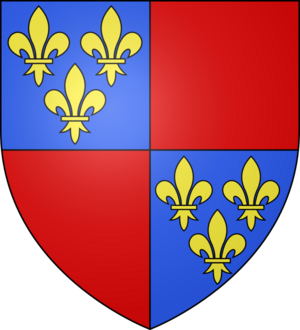Charles II d'Albret facts for kids
Charles II d'Albret (born 1407, died 1471) was an important French noble, leader, and soldier. He lived during a time when France was fighting the Hundred Years' War.
Charles was the son of Charles I of Albret and Marie de Sully. His father died in 1415 at the Battle of Agincourt. This meant young Charles became the lord of Albret. He also became the "titular" Count of Dreux. This means he had the title, but the English actually controlled the land at that time. Charles II d'Albret was a cousin and strong supporter of the Dauphin Charles. The Dauphin later became King Charles VII of France. Charles d'Albret also had family ties to the king's court.
A Supporter of the King
Charles d'Albret was part of King Charles VII's royal council. He joined in the military campaigns with Joan of Arc. He was also present at the coronation of Charles VII in Reims. During this important ceremony, Charles d'Albret carried the king's sword. Later, he was named a "lieutenant general" for the Berry region. This meant he was a high-ranking military and administrative leader there.
Regaining Dreux
In 1441, King Charles VII officially gave Charles d'Albret control of the county of Dreux. This confirmed his ownership of the land.
Later Challenges
During the rule of King Louis XI, Charles d'Albret joined a group of nobles who rebelled. This rebellion was called the War of the Public Weal. The nobles wanted to gain more power from the king.
Family Life
Charles d'Albret and his wife, Anne of Armagnac, had seven children:
- Jean d'Albret (1420–1468)
- Louis d'Albret, who became a Cardinal (1422–1465)
- Arnaud Amanieu d'Albret (died 1463)
- Charles d'Albret (died 1473)
- Gilles d'Albret (died 1479)
- Marie d'Albret (died 1486), who married Charles I, Count of Nevers. They had no children.
- Jeanne II d'Albret (died 1444), who married Arthur III, Duke of Brittany. They had no children.
His Legacy
When Charles d'Albret died, his main land, Albret, went to his grandson, Alain. Alain was also known as Alain the Great. However, Charles had wanted to leave the county of Dreux to his third son, Arnaud Amanieu. But Alain took control of Dreux as well. Charles's fourth son, Charles, was executed in 1473 for treason.
Sources
- Bordonove, Georges, Charles VII le Victorieux. Paris: Pygmalion, 1985.
 | Delilah Pierce |
 | Gordon Parks |
 | Augusta Savage |
 | Charles Ethan Porter |


